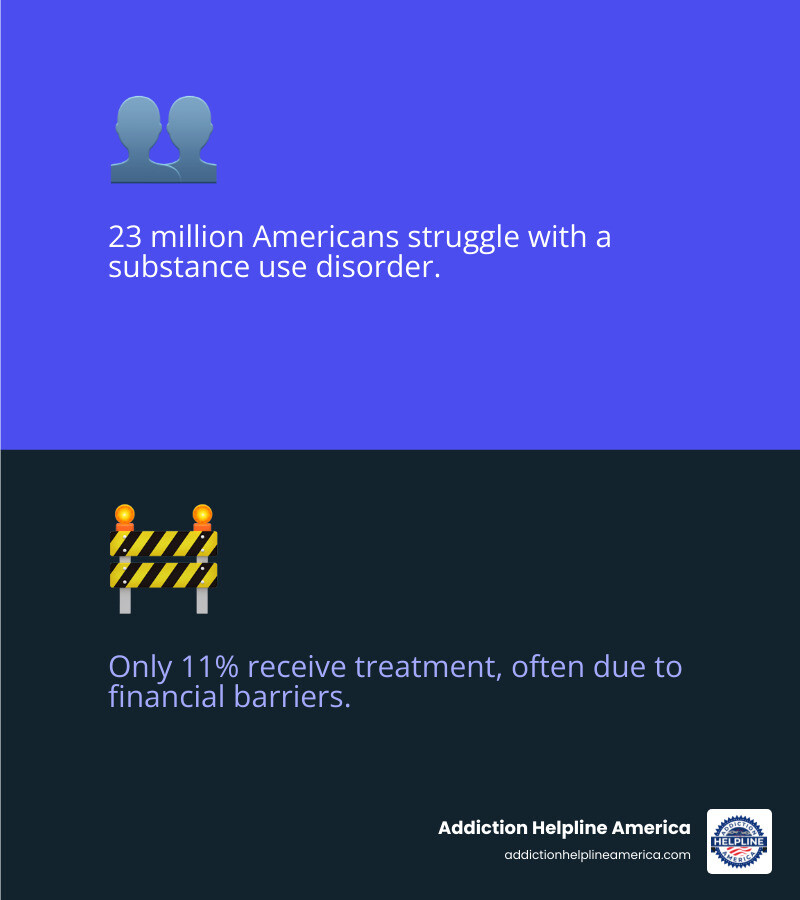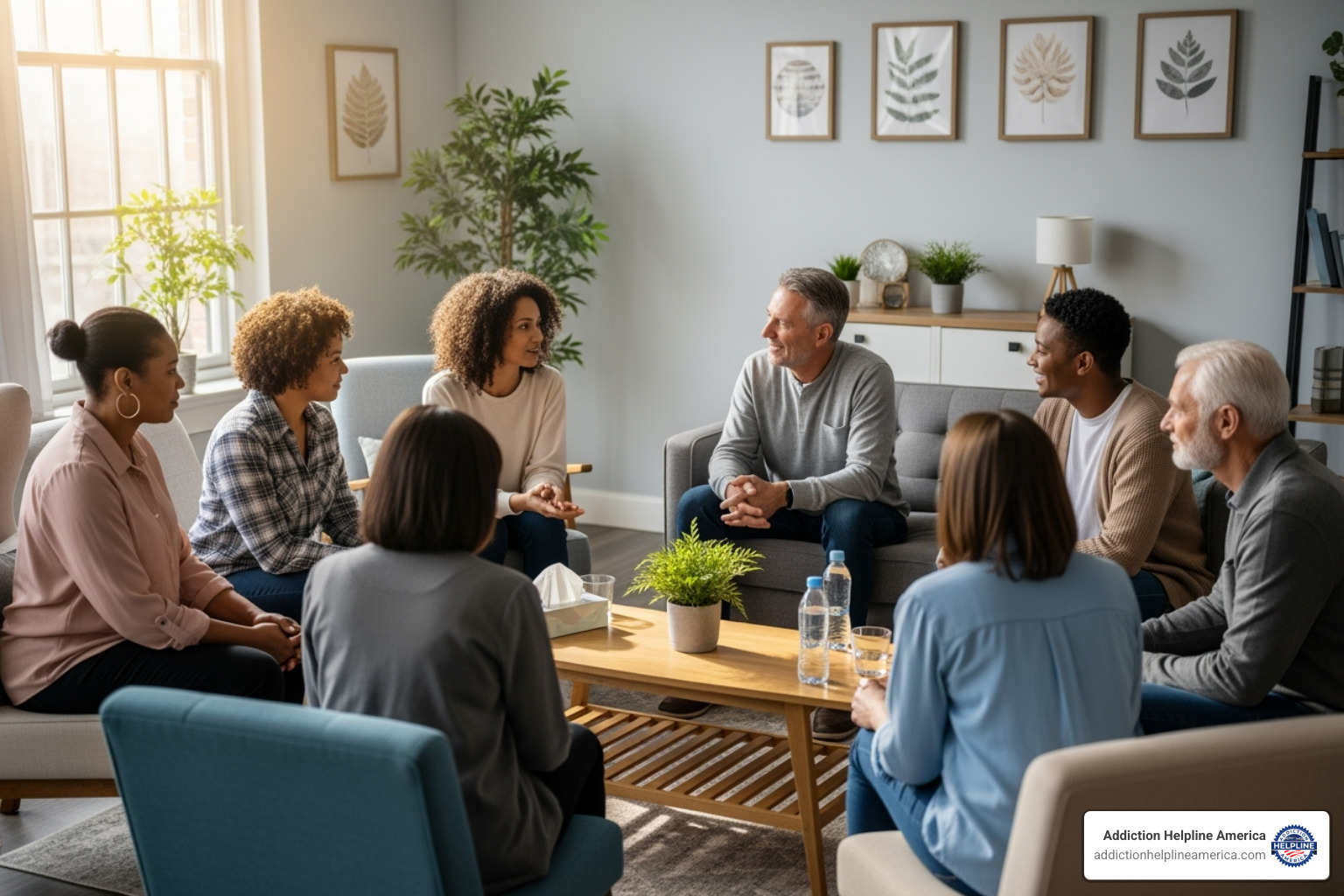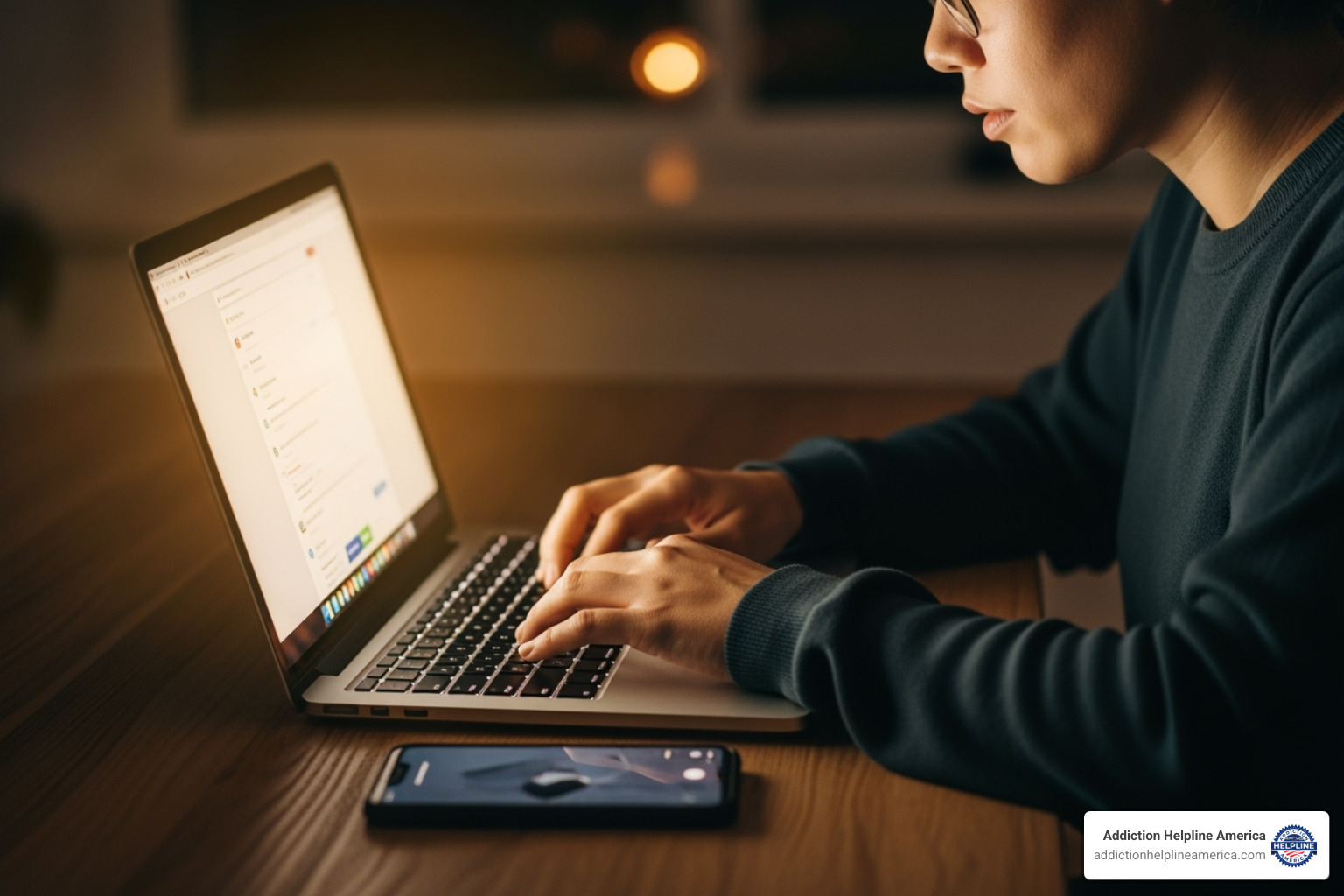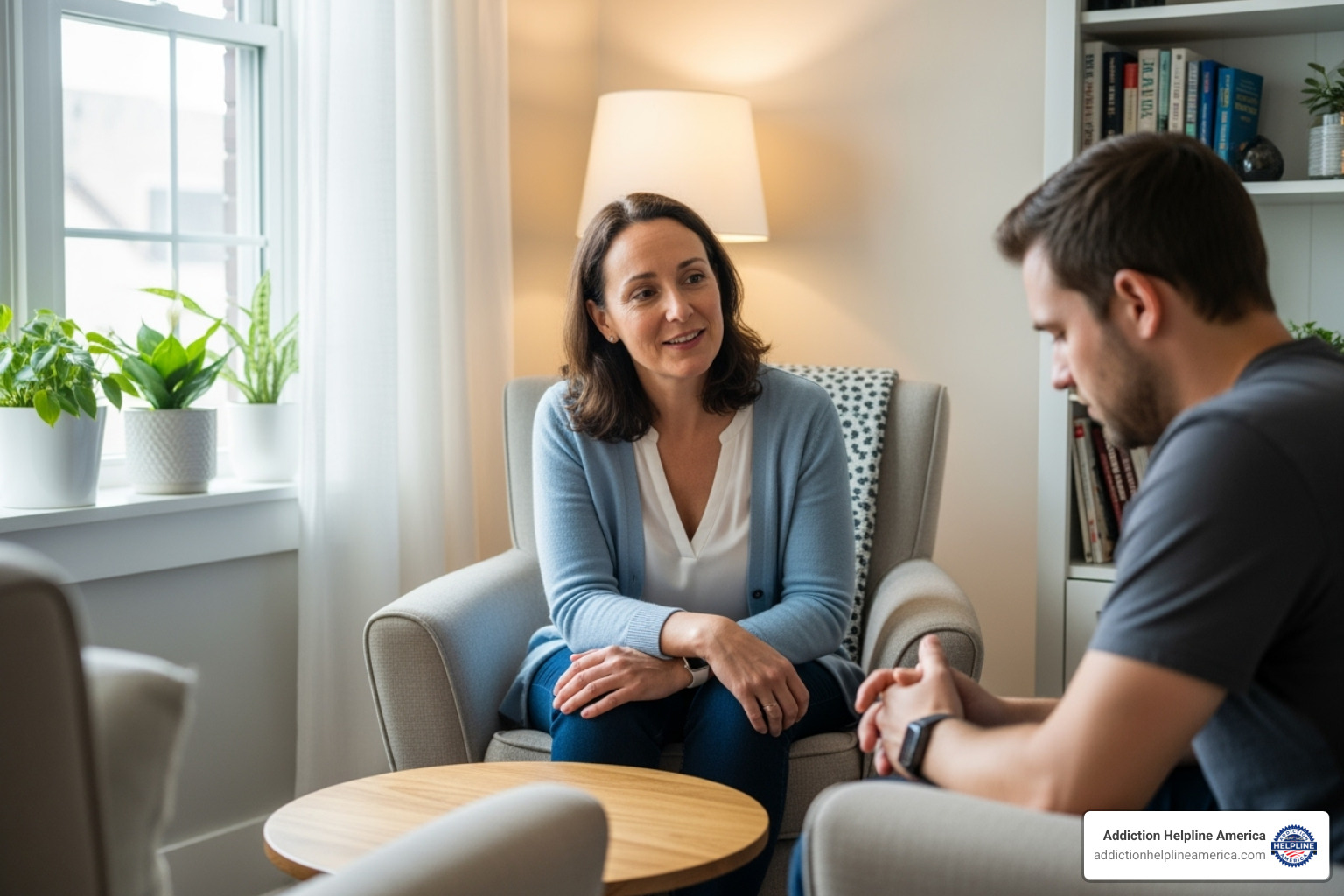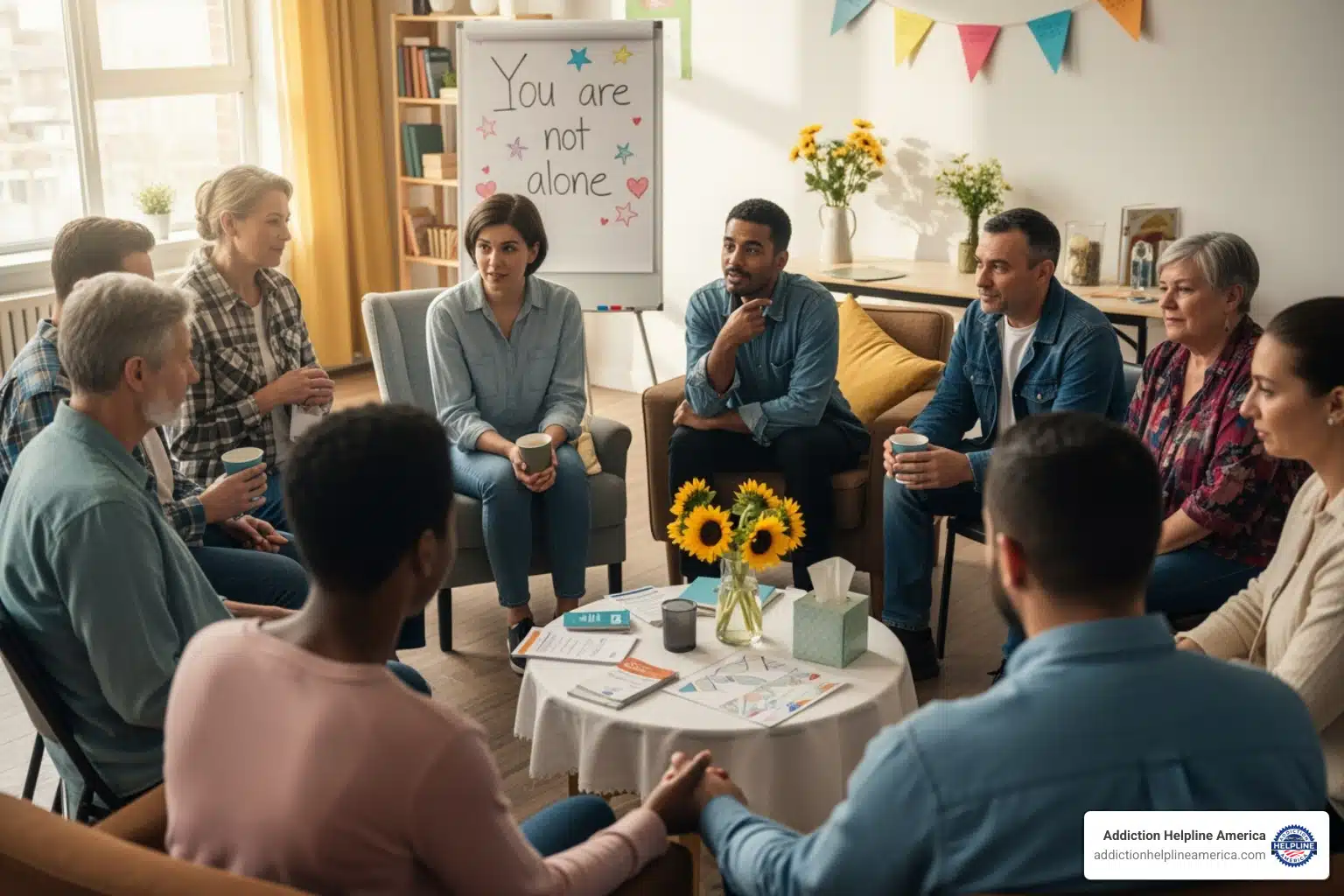
Why Free Addiction Resources Are Critical for Recovery
Free addiction resources are essential lifelines for the millions of Americans struggling with substance use disorders who cannot afford private treatment. Here’s what you need to know:
Most Common Types of Free Addiction Help:
- State-funded treatment programs – Available through public mental health centers
- SAMHSA’s National Helpline – 1-800-662-HELP (4357) for 24/7 confidential support
- Peer support groups – Like Alcoholics Anonymous and Narcotics Anonymous
- Community health centers – Offering sliding-scale or no-cost services
- Faith-based recovery programs – Often requiring completion of detox first
The statistics paint a stark picture: one in 14 Americans reports experiencing a substance use disorder, yet only 11% of those suffering from addiction receive treatment. This massive treatment gap often stems from financial barriers, with many viewing recovery as financially impossible.
The reality is different. Most states offer affordable addiction treatment through publicly funded programs, specifically designed for those with no insurance, limited income, or financial hardship. These programs prioritize certain populations, including pregnant women and those with IV drug dependencies.
Recovery is possible, regardless of your financial situation. Whether you’re facing unemployment, homelessness, or simply can’t afford private treatment, numerous pathways exist to access quality care and support.
At Addiction Helpline America, we’ve spent years connecting individuals and families to free addiction resources that provide real hope and lasting recovery solutions. Our comprehensive network and 24/7 support ensure that financial constraints never stand between you and the help you deserve.
Understanding the Types of Free Addiction Resources
When you’re struggling with addiction, the fear of treatment costs can feel like an impossible wall. But here’s something that might surprise you: free addiction resources are everywhere, waiting to help you take that first step toward recovery. These resources come in different forms, each with its own strengths and approaches to healing.
Think of it this way: recovery support exists at three main levels. There’s government-backed help through state programs, community-driven support from local organizations, and peer-to-peer connection through support groups. Each plays a vital role in creating a safety net that catches people when they’re ready to change their lives.
State-Funded and Government-Backed Programs
Your state government understands that addiction doesn’t discriminate based on your bank account. That’s why state-funded programs exist as a cornerstone of free addiction resources. These programs operate through public mental health centers and substance misuse treatment centers, funded by both federal and state grants.
Here’s what makes these programs special: they’re designed specifically for people who are uninsured, have low income, or are facing unemployment. In places like Ventura County, treatment services are completely free for anyone under 18, and staff members will actually help you steer insurance options like Covered California and Medi-Cal.
The Substance Abuse and Mental Health Services Administration (SAMHSA) backs many of these efforts with substantial funding dedicated to preventing and treating substance abuse. When you access these services, you’re tapping into a network that has real resources and clinical expertise.
To qualify, you’ll typically need to show state residency, provide income verification, and confirm your legal residence status. The Find a Health Center tool can help you locate community health centers that offer mental health and substance use disorder services with Medicaid coverage options.
Community and Non-Profit Organizations
Beyond government programs, your local community is likely home to organizations that have made helping people recover their mission. These community-based organizations and non-profit organizations run on donations, grants, and the dedication of volunteers who understand that recovery takes a village.
Local charities like The Salvation Army Adult Rehabilitation Centers offer residential treatment options, while smaller community outreach programs might provide supportive counseling and group meetings right in your neighborhood. These programs become true community support systems, creating safe spaces where people from all backgrounds can find help.
Many of these organizations have a faith-based approach, though they welcome people regardless of their beliefs. One thing to keep in mind: some programs may require you to complete medical detox requirements elsewhere before joining, since they might not offer medical detoxification services themselves.
What’s beautiful about these programs is how they understand that addiction affects entire communities. They’re not just treating individuals – they’re working to heal families and neighborhoods too.
Peer Support Groups and Meetings
Sometimes the most powerful healing happens when people who’ve walked the same path share their experiences. Peer support groups represent some of the most accessible free addiction resources available, and they’re based on a simple but profound idea: one person in recovery helping another.
Alcoholics Anonymous (AA) and Narcotics Anonymous (NA) are peer-led recovery groups that have been changing lives for decades. These recovery-focused meetings offer anonymity and the power of shared experience. You can simply sit and listen, or share your story – it’s entirely your choice.
The beauty of group support is that it’s available almost everywhere, almost every day. AA alone has been helping people recover for over 80 years with a program that’s both simple and effective. Other models like Self-Management And Recovery Training (SMART Recovery) take a different approach, focusing on self-empowerment and cognitive behavioral therapy techniques.
These meetings are free, and the only requirement is a desire to stop drinking or using drugs. Whether you’re just starting to think about recovery or you’ve been sober for years, these groups provide ongoing support and proof that recovery is not only possible – it’s happening all around you.
| Feature | State-Funded Rehab | Community-Based Programs | Peer Support Groups |
|---|---|---|---|
| Cost | Free or sliding scale | Free or low-cost (donations often accepted) | Free (voluntary contributions) |
| Services | Detox, inpatient/outpatient, MAT, counseling | Counseling, outreach, basic support, housing | Group meetings, sponsorship, shared experience |
| Eligibility | Low income, no insurance, state residency, specific populations | Varies by organization, often broad | Desire to stop using/drinking |
| Philosophy | Medical/clinical, evidence-based | Holistic, community-focused, often spiritual | Peer-led, mutual aid, 12-step/SMART |
How to Find and Access No-Cost Treatment
When you’re ready to take that brave first step toward recovery, knowing where to turn can feel overwhelming. The good news? Free addiction resources are more accessible than many people realize, and there are proven pathways to help you find exactly what you need.
The key is knowing where to look and what to expect. Whether you’re searching at 2 AM when anxiety hits hardest, or you’re helping a loved one during a crisis, these resources are designed to meet you wherever you are in your journey.
Using National Helplines and Treatment Locators
Sometimes the hardest part is making that first phone call. National helplines exist specifically to make this easier – they’re staffed by compassionate professionals who understand exactly what you’re going through.
SAMHSA’s National Helpline at 1-800-662-HELP (4357) is your go-to resource for immediate support. This service operates 24 hours a day, every day of the year, providing confidential help in both English and Spanish. The trained staff can connect you to treatment facilities, support groups, and community services in your area. Best of all, it’s completely free and confidential.
If you’re in immediate crisis, the 988 Suicide & Crisis Lifeline offers round-the-clock support. Simply call or text 988 to connect with trained counselors who can help with emotional distress, mental health concerns, or substance use crises. There’s also the Disaster Distress Helpline at 1-800-985-5990 for those dealing with trauma-related substance use.
Online treatment locators can be incredibly powerful tools when you’re ready to research options. SAMHSA’s FindTreatment.gov lets you search confidentially for facilities by location, type of care, and even specific treatments like medication-assisted therapy. You can filter results based on your needs, whether that’s outpatient counseling, residential treatment, or specialized programs.
At Addiction Helpline America, we take this a step further by providing personalized guidance. Our team helps you steer these options and connects you to the right program from our extensive network – all at no cost to you.
How to Find State-Funded Free Drug and Alcohol Rehab Centers
Every state recognizes that addiction doesn’t discriminate based on income, which is why free addiction resources through state funding exist nationwide. The process of accessing these programs is straightforward once you know the steps.
Start by contacting your state’s substance abuse agency. A quick online search for your state plus “substance abuse agency” or “mental health services” will lead you to the right department. These agencies maintain directories of state-funded facilities and can walk you through the application process.
Eligibility requirements are typically designed to help those who need it most. You’ll need to demonstrate an inability to pay for treatment, which is usually the primary factor. State residency proof is required, along with income verification showing your financial situation. Legal U.S. residence is also necessary for most programs.
Some programs give priority to specific populations. Pregnant women often receive immediate placement, as do parents with dependent children, individuals who inject drugs, and veterans. If you fall into any of these categories, mention it when you call.
The National Institute on Drug Abuse offers a helpful Step-by-Step guide to finding treatment that breaks down the process into manageable steps. This resource can be particularly valuable when you’re feeling overwhelmed.
Don’t overlook Medicaid coverage if you qualify. Many states have expanded Medicaid to cover substance abuse treatment, which can make quality programs effectively free for eligible individuals.
What to Expect from Free Addiction Resources
Understanding what to expect from free addiction resources helps you prepare mentally and practically for the journey ahead. These programs focus on providing essential, evidence-based care that gives you the best chance at lasting recovery.
Screening and assessment will be your first step with any program. This thorough process helps treatment providers understand your specific situation, the severity of your addiction, and any mental health concerns. Think of it as creating a roadmap for your recovery – the more honest you are, the better they can help you.
Waitlists are a reality for some popular programs due to high demand and limited funding. Don’t let this discourage you. Get on the list immediately and ask about interim support options. Many agencies can connect you to support groups, outpatient counseling, or other resources while you wait for residential treatment.
The core treatment services you’ll receive focus on what research shows works best. Detoxification provides a safe, medically supervised environment for withdrawal, typically lasting about five days. Individual and group counseling help you understand the root causes of your addiction and develop healthy coping strategies.
Case management becomes your lifeline for navigating practical concerns like housing, employment, and healthcare. Aftercare planning ensures you don’t face the transition back to daily life alone – you’ll have a solid plan for continued support.
While free programs prioritize clinical care over luxury amenities, this focus on recovery essentials is actually a strength. You might have shared rooms and basic facilities, but you’ll receive the same evidence-based treatments that work in expensive private facilities. The goal is equipping you with practical tools for long-term sobriety, and that’s exactly what these programs deliver.
Finding Help for Specific Substance Use Disorders
Different substances create unique challenges, and the good news is that specialized free addiction resources exist to address each one effectively. Whether you’re struggling with opioids, alcohol, or other substances, understanding the specific support available can make all the difference in your recovery journey.
Free Resources for Opioid Addiction
The opioid crisis has prompted an unprecedented response in free addiction resources, with many programs specifically designed to address this devastating addiction. The most effective approach combines medication with counseling – something called Medication-Assisted Treatment, or MAT.
MAT works by helping your brain heal while you focus on recovery. Instead of the extreme highs and lows of active addiction, medications like buprenorphine and methadone help normalize your brain chemistry. They block the euphoric effects of opioids, reduce cravings, and allow your body to function normally without the negative effects of drug misuse.
Finding these medications through free addiction resources is easier than you might think. Buprenorphine (often combined with naloxone as Suboxone) is available through many practitioners who are specially authorized to prescribe it. You can find these providers using SAMHSA’s Buprenorphine Practitioner & Treatment Program Locator.
Methadone programs, called Opioid Treatment Programs (OTPs), offer another proven medication option. These specialized clinics provide methadone and often buprenorphine as well. SAMHSA maintains an Opioid Treatment Program Directory where you can search for programs in your area.
One of the most important free addiction resources for opioid addiction is naloxone – the life-saving overdose reversal medication. This drug can literally bring someone back from an overdose by rapidly restoring normal breathing. Many community programs, pharmacies, and health centers distribute naloxone for free, along with training on how to use it. The National Institute on Drug Abuse provides comprehensive information about Naloxone for Opioid Overdose: Life-Saving Science.
Many state-funded programs prioritize opioid addiction treatment, especially for people who inject drugs, pregnant women, and parents with dependent children. These programs often provide MAT as part of their comprehensive treatment approach.
Free Resources for Alcohol Use Disorder
Alcohol use disorder affects more Americans than any other addiction, but it also has some of the most established and accessible free addiction resources available. The path to recovery from alcohol addiction has been walked by millions before you, and their experience has created a robust support system.
Alcoholics Anonymous remains the cornerstone of free alcohol addiction support. With meetings happening daily in virtually every community, AA provides a peer-led approach where people share their experiences and support each other through a 12-step program. What makes AA special is its accessibility – meetings are free, anonymous, and open to anyone with a desire to stop drinking. You can simply show up, sit quietly, and listen, or share as much or as little as you’re comfortable with. Find meetings near you through Alcoholics Anonymous.
Family support is equally crucial in alcohol recovery. Al-Anon and Alateen offer vital free addiction resources for families and friends who are affected by someone else’s drinking. These groups provide a safe space to share experiences and learn healthy coping strategies. The Al-Anon hotline at 800-356-9996 connects callers with counselors and local support groups for both Al-Anon and Alateen.
Medical detoxification is often the necessary first step for severe alcohol dependence. Alcohol withdrawal can be dangerous and even life-threatening, making supervised detox crucial for safety. Many state-funded programs and public health centers offer free or sliding-scale withdrawal management services, ensuring you can detox safely before moving into longer-term treatment.
Professional counseling specifically custom for alcohol use disorder is available through public mental health centers and community organizations. These free addiction resources help you explore the underlying causes of your drinking, develop healthy coping mechanisms, and build strong relapse prevention skills. The combination of peer support through AA and professional counseling creates a comprehensive support system that addresses both the social and psychological aspects of recovery.
The beauty of alcohol addiction recovery is that help truly is everywhere once you know where to look. From the neighbor who’s been sober for years to the community health center down the street, free addiction resources for alcohol use disorder are woven into the fabric of recovery communities across the country.
Frequently Asked Questions about Free Addiction Help
When you’re considering reaching out for help, it’s natural to have questions about what’s available and whether you’ll qualify. We’ve been helping people steer these waters for years, and these are the questions we hear most often about free addiction resources.
Who qualifies for free addiction treatment programs?
The good news is that qualification for free addiction treatment programs is primarily about need, not complicated requirements. If you’re struggling financially and can’t afford private treatment, you’re likely already a good candidate for these programs.
Financial need is the biggest factor. Most programs are designed for people with low income or no income at all. You’ll typically need to provide some documentation showing your financial situation, but don’t let paperwork concerns stop you from calling – staff at these programs help people through this process every day.
State residency matters for most state-funded programs. You’ll need to prove you’re a legal resident of the state where you’re seeking treatment. This usually just means having a state ID or other official documentation.
Some groups get priority access to certain programs. Pregnant women struggling with substance use often move to the front of waiting lists, which makes sense given the urgency of their situation. Parents with dependent children, people who inject drugs, and veterans also frequently receive priority consideration.
Lack of health insurance often makes you eligible for programs you might not have known existed. Even if you think you have no coverage options, it’s worth having someone check – you might qualify for Medicaid or other benefits that could open up additional treatment options.
What services are typically included in free addiction rehab programs?
Free addiction rehab programs focus on giving you the essential tools for recovery. While they might not have luxury amenities, they provide comprehensive, evidence-based care that’s proven to work.
Detoxification is often the starting point if you need it. This means having medical supervision while your body safely withdraws from substances. It typically takes about five days in a 24-hour supervised setting, and having medical professionals there makes all the difference in your safety and comfort.
Counseling forms the heart of most programs. You’ll have individual sessions where you can work through personal issues and triggers with a counselor. Group therapy brings you together with others who understand what you’re going through – there’s something powerful about realizing you’re not alone in this struggle.
Case management helps you steer everything else. Your case manager becomes your advocate, helping you connect with housing assistance, job training, legal aid, or other services you might need. They understand that recovery involves more than just stopping substance use.
Aftercare planning ensures you don’t leave empty-handed. Before you complete the program, you’ll work with staff to create a personalized plan for ongoing support. This might include outpatient therapy, sober living arrangements, or regular support group meetings.
Medication-Assisted Treatment (MAT) is increasingly available in free programs, especially for opioid and alcohol use disorders. These medications, combined with counseling, can significantly improve your chances of successful recovery.
Many programs also offer specialized tracks for specific needs. Women’s programs, youth services, and support for people involved with the criminal justice system are becoming more common.
What steps should I take to prepare for a call to a free addiction hotline?
Making that first call takes courage, and being prepared can help you get the most out of the conversation. The person on the other end wants to help you succeed, so the more information you can share, the better they can guide you.
Gather your basic information before calling. Have your age, location, and contact details ready. If you have any form of health insurance – even if you don’t think it covers addiction treatment – mention it. You might be surprised what’s covered.
Think through your substance use history. What are you using, how long have you been using it, and roughly how much? If you’ve tried to quit before or had previous treatment, that’s helpful information too. Don’t worry about being exact – estimates are fine.
Find a quiet, private space where you can talk openly. These conversations are confidential, but you’ll feel more comfortable sharing honestly if you know you won’t be overheard or interrupted.
Write down your questions ahead of time. You might want to ask about treatment options in your area, how long programs last, whether there are waiting lists, or what the next steps would be. Having your questions written down ensures you don’t forget anything important when you’re on the call.
Be completely honest with the person helping you. They’ve heard it all before, and they’re not there to judge – they’re there to help. The more truthful you are about your situation, your concerns, and your needs, the better they can connect you with the right free addiction resources.
The person answering your call understands how difficult it is to reach out. They’re trained to help people in exactly your situation, and they want to see you succeed in finding the right path to recovery.
Your Path to Recovery Starts Today
Right now, as you’re reading these words, you’re already taking one of the most important steps toward healing. Recovery is absolutely possible, and thousands of people just like you have found their way to sobriety through free addiction resources. The path ahead might seem uncertain, but you don’t have to walk it alone.
The truth is simple: help is available regardless of your financial situation. Whether you’re unemployed, uninsured, or simply can’t afford private treatment, the resources we’ve discussed throughout this guide are real, accessible, and waiting for you. From state-funded programs to peer support groups, from national helplines to community organizations, there’s a network of support designed specifically for people facing the same challenges you’re experiencing right now.
Taking that first step is often the hardest part. Maybe it’s picking up the phone to call a helpline. Perhaps it’s walking into your first AA meeting. It could be reaching out to your state’s substance abuse agency. Whatever that first step looks like for you, it’s the most crucial action you can take today.
At Addiction Helpline America, we understand that making that first call can feel overwhelming. That’s exactly why we’re here. Our compassionate advisors are available 24/7, ready to listen without judgment and guide you toward the support you deserve. We’ve spent years building connections with treatment centers and free addiction resources across the country, and we know how to help you find exactly what you need.
You don’t need to figure this out on your own. Our mission is simple: to connect individuals nationwide to addiction and mental health treatment centers, providing free, confidential, and personalized guidance to find the right recovery program from our vast network. Don’t let financial worries stand in the way of your health and future.
The conversation is completely confidential, and there’s no obligation beyond taking care of yourself. Our advisors understand the challenges you’re facing, and they’re here to help you steer the options available in your area.
Recovery starts with a single phone call, a single decision, a single moment of hope. Today can be that day for you.
Our helpline is 100%
free & confidential
If you or someone you care about is struggling with drug or alcohol addiction, we can help you explore your recovery options. Don’t face this challenge alone—seek support from us.
Programs
Resources
Will my insurance
cover addiction
treatment?
We're ready to help
Find the best
drug or alcohol treatment
center
Are you or a loved one struggling with addiction? Call today to speak to a treatment expert.

